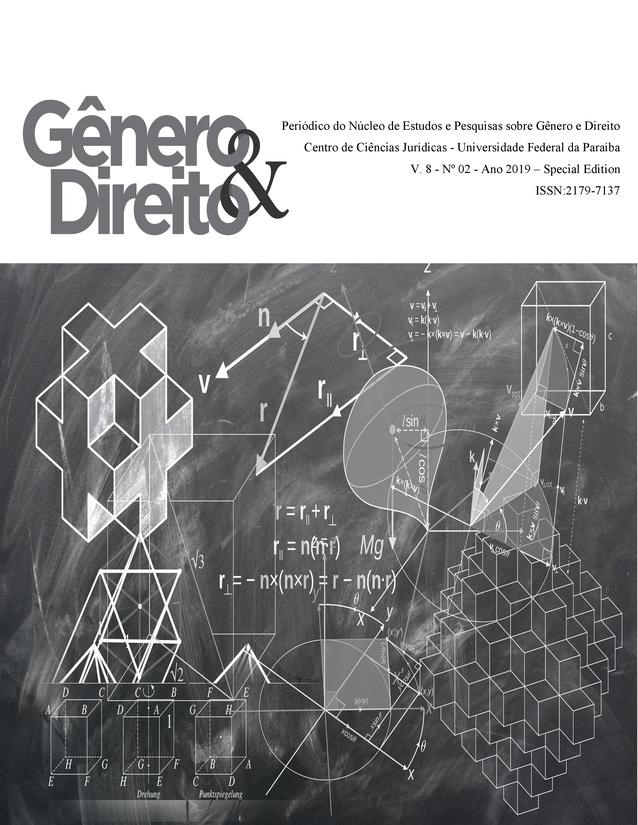CRIME IN THE EYES OF ISLAMIC JURISPRUDENCE AND CRIMINOLOGY
DOI:
https://doi.org/10.22478/ufpb.2179-7137.2019v8n2.46467Palavras-chave:
crime, sin, criminology, Islamic jurisprudenceResumo
Crime is a modern legal term and its nature is different and distinct from religious or judicial sins. Throughout the lexicon and dictionary of the legal terminology and criminology, in terms of the meaning, there is no lexis or word more complicated than of the term crime or misdemeanor. In the law literature and world the comprehensive term of "crime" is used and punishment is foreseen for its executive enforcement. When a verdict wants to acquire its sovereignty or religious (canonical) nature, that decree or verdict must go along its stages from the initial to the end. These steps involve fabrication (creation) and announcement and verification and implementation (execution). When a verdict implies as a governmental rule, as well as the religious rules, the four above steps are passed, and till these stages are completed, the attributing of verdict to its source will be permissible. In the religious or judicial term, crime is the act (conduct) or the abandonment (omission) of the act (promise or omission of promise) that Islam considered obligatory or forbidden to commit or abandon it which a mundane or heavenly punishment has been imposed. In other words, crime is an opposition or objection to the orders and desecration of a book and a tradition, or committing act that leads to the corruption of an individual or society. In jurisprudence, without implying the term "crime", definitions of acts which are deserve by ta'zir (flogging, discretionary punishment) and punishment. It is mentioned that committing deadly sins and insisting on minor sin is deserved to discretionary punishment awarded by judge; in other texts, it is stated: The committing of prohibited acts and the leaving obligatory measures, which is not specified in the canon law, requires discretionary punishment awarded by judge. Accordingly, in jurisprudence the crimes are related to physical or corporal integrity which are often referred to as "crimes (felonies)" and involve retaliation or Blood money (diya), or they are crimes which their punishment are determined by canon law of Islam, and referred to as "Islamic prescribed punishment (provisions, ambit)", otherwise they will be titled " discretionary punishment awarded by judge ".Downloads
Referências
Abdolahi, M. (2002). Remembrance of Robert King Merton, Iran’s Journal of Sociology, No. 2.
Dadsetan, P. (2010) Criminal Psychology, SAMT Publication, Seventh Edition.
Danesh, Taj Zaman, 1998, what is crime, what is criminology? Library of knowledge Treasure, 9th Edition.
Ebn asir, al-Nahyah al-Fayyid al-Hadith and al-Awaf. (1991). Ajme Publication, Beirut,.
Ezazi, Sh. (2001). Family Violence and Beaten Women, Sally Publishing.
Feiz, A. (1989). Association and Compliance with Public and Islamic Penal Law, Vol. I, Second Edition, Publications of the Ministry of Culture of Iran.
Goodarzi, F. (1998). Forensic Medicine, Volume II, Einstein Publications.
Isfahani,R, Vocabulary in the holy Quran, research by Seyed Mohammad Gilani, Beirut, Daralamarrofa, Beita.
Jangali, E. (2013) Investigating the Causes of Women's Murder in Isfahan, Master's Degree thesis in Criminal Law and Criminology, Islamic Azad University, Khorasgan Branch.
Khomeini, R. (1994).Tool of Editing, Beirut, Dar al-Zahra (Zahra’s house), Volume 2.
Kie nia, M. (1983). Criminal Sociology, Tehran.
Mir Khalili, SM. (2004). Situational Prevention from the Islamic Teachings Viewpoint, Journal of jurisprudence and law, no. 1.
Momtaz, f. (2002). social deviations; theories and views, Publication of publishing shares.
Najafi Tavana, A. (2003). Delinquent Disorders of Children and Adolescents, Rah-e Tarbiat Publication.
Sarvestani, R. (2010) Social Pathology (Sociology of Deviations), Avay Noor Publication, 21st Edition.
Sekhavat, J. (2002). Sociology of Social Deviations, Payame Noor Publications.
Sotoudeh, H and Bahari, S. (2007). Family Pathology, Neda Ariana Publication.
White, Rt and Hines, G. (2002). Crime and Criminology, Translated by Mir Ruhollah Sedigh Dagestar Publication.

